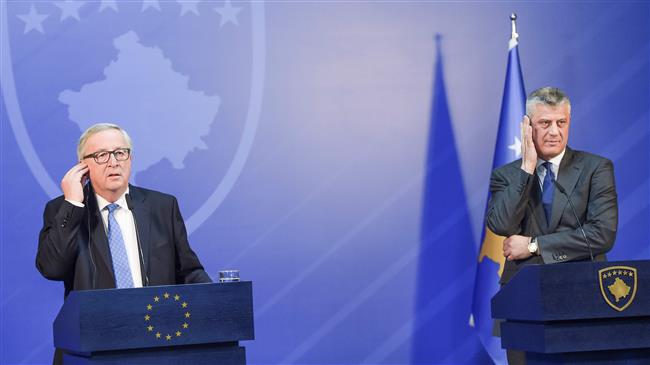EU reiterates call on Kosovo to accept border deal to join Schengen
European Commission President Jean-Claude Juncker has conditioned Kosovo’s possible accession to the European visa-free travel zone known as Schengen on accepting a border demarcation agreement with Montenegro and improved ties with Serbia.
Juncker, on a first visit by an EU Commission chief to Pristina on Wednesday, said the border deal with Montenegro was a precondition for Kosovo's citizens to travel freely within Schengen.
“It is crucial for your country to vote on demarcation, it’s a key step, inevitable and absolutely necessary for visa liberalization,” said Juncker in a joint press conference with Kosovo President Hashim Thaci.
Juncker, who was also accompanied by EU foreign policy chief Federica Mogherini and Enlargement Commissioner Johannes Hahn, said Kosovo should also improve ties with Serbia, the country which has yet to recognize Kosovo, a former territory, as an independent state.
He said that “ties between Kosovo and Serbia are fundamental” in their path toward Europe.
Montenegro recognizes Kosovo’s 2008 independence and accepts the demarcation agreement. However, opposition parties in Kosovo have rejected the 2015 deal, saying its ratification would result in Kosovo losing territory. International experts have dismissed the notion.
The Kosovo assembly was expected to vote on the deal on Wednesday but it failed to convene a meeting. However, Thaci expressed hope that the deal would finally be passed.
“Although it is clear that the Assembly did not manage to ratify the agreement today, I don’t want to comment because I’m sure that it will be ratified soon,” Thaci said in the joint press conference with Juncker.
Juncker is in Pristina after his visits to Macedonia, Serbia, Montenegro and Bosnia and Herzegovina. His Balkan tour will end Thursday in Bulgaria, the country that currently holds the EU’s rotating presidency.
‘All wars have rules. All of those rules have been broken’ by Israel
VIDEO | Report flags India’s violation of rights of Rohingya detainees
Turkey's foreign minister meets Syria's de facto leader in Damascus
'Next to impossible' to rescue patients from Gaza's Kamal Adwan Hospital: Director
VIDEO | Vietnam current prosperity
Report blames gasoil exports for shortage at Iranian power plants
VIDEO | Hind Rajab Foundation names Israeli war criminals vacationing after Gaza genocide
VIDEO | Australians rally for Gaza ahead of Christmas festivities













 This makes it easy to access the Press TV website
This makes it easy to access the Press TV website